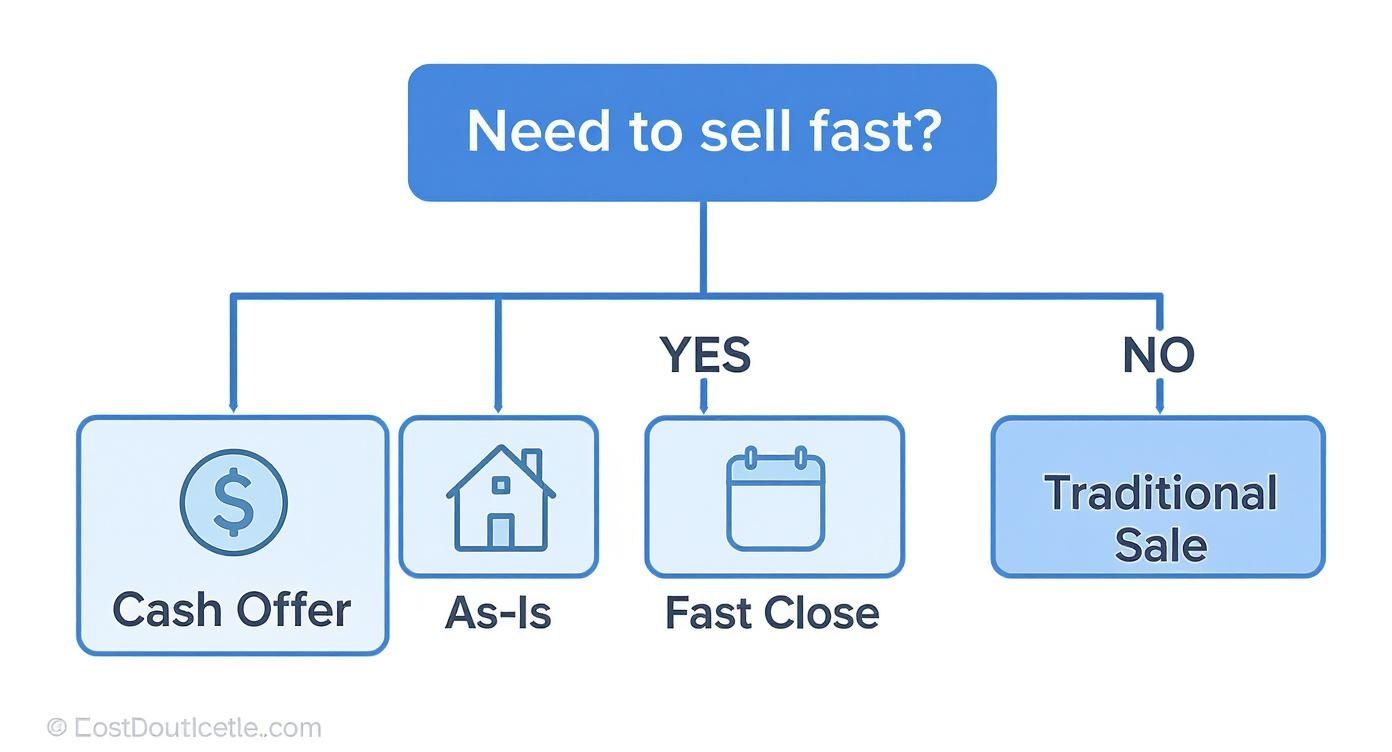What Is a Quick Sale of a House
Learn what is a quick sale of a house and how it works. Explore fast-selling options to see if this strategy is the right choice for your situation.
By James Le
When you hear "quick house sale," think speed and certainty above all else. It’s a lot like trading in your car at the dealership instead of going through the hassle of a private sale. You know you’re leaving money on the table, but you get a guaranteed offer, right now, without the usual headaches.
What a Quick House Sale Really Means
At its core, a quick sale is just the traditional home-selling process stripped down to the bare essentials. All the things that cause delays and nail-biting uncertainty? Gone.
Instead of spending weeks or months staging your home, dealing with endless showings, and crossing your fingers that a buyer's financing doesn't fall through at the last minute, a quick sale carves a direct path to the closing table. It’s built for homeowners who are racing against the clock.
This approach usually boils down to a few key things:
- All-Cash Offers: The buyers are typically real estate investors or specialized cash-buying companies. They aren't waiting on a bank to approve a mortgage, which immediately cuts out the riskiest and longest part of a typical sale.
- Selling "As-Is": This is a big one. You sell the property in its current state—no repairs, no renovations, not even a deep clean. This saves you a ton of time and upfront cash.
- Minimal Contingencies: Quick sales are clean. They rarely include the inspection or appraisal contingencies that can so often derail a standard transaction.
Speed is Relative to the Market
Just how fast a home sells always depends on the local market and your pricing strategy. Nationally, the median home price recently hit $413,000, but the properties that moved the fastest were often priced 2–4% below their market value to create a bidding frenzy.
In a hot market like Rochester, NY, homes can fly off the shelf in just 5–14 days because inventory is tight and demand is high. But in a slower market, even a competitively priced home might sit for 45–90 days or more. Even small things matter—85% of real estate pros say a simple coat of soft white paint adds the most value for a quick turnaround. You can get more great insights into current real estate market trends at Kiplinger.com.
A quick house sale is a strategic choice. You’re trading maximum profit for a guaranteed closing date and pure convenience. It’s the perfect solution when life throws you a curveball, like a sudden job relocation, financial pressure, or the need to sell an inherited property without a fuss.
Exploring Your Options for a Fast Sale
When you need to sell your property yesterday, you’ve got a few different paths you can take. Each one comes with its own timeline and set of trade-offs, and figuring out which one fits your situation is the first big step. Generally, the quicker the sale, the more you trade equity for speed and pure convenience.
This handy decision tree can help you start mapping out your journey.

As you can see, if speed is your absolute priority, you’ll likely lean toward cash offers. This route lets you sell your home "as-is" and close on a schedule you can bank on, sidestepping all the usual delays of a traditional sale.
Common Paths to a Quick Sale
For homeowners with an eye on the calendar, four main strategies usually come into play. Each one strikes a different balance between the final sale price, how easy the process is, and how much control you have.
Here's a quick rundown of how the main methods compare, helping you see the trade-offs at a glance.
Comparing Quick House Sale Methods
| Method | Typical Timeline | Potential Sale Price | Convenience Level | Best For |
|---|---|---|---|---|
| Cash Buyer/iBuyer | 7-14 Days | Below Market Value | Very High | Maximum speed and certainty; avoiding repairs. |
| Real Estate Auction | 30-45 Days | Varies (Market-Driven) | Medium | Generating competitive bids on a fixed date. |
| Agent-Assisted Sale | 30-60+ Days | Full Market Value | High | Maximizing price while still moving quickly. |
| For Sale By Owner (FSBO) | Varies Widely | Below Agent-Assisted | Low | Sellers with marketing savvy and time to manage the process. |
Ultimately, the "best" method really depends on your personal goals—whether that’s cash in hand next week or getting top dollar next month.
The Cash Offer and Auction Routes
-
Cash Home Buyers and iBuyers: These are companies built for speed. They make all-cash offers and can close in as little as 7-14 days. It's the fastest way to sell, but it typically comes at a discount since they have to factor in repair costs and their own profit.
-
Real Estate Auctions: An auction puts your property on a stage, creating a competitive environment designed to get it sold on a specific day. While you can hit a fair market price through bidding, the outcome is never a sure thing, and you'll have to budget for marketing expenses upfront.
A quick house sale isn't a one-size-fits-all deal. It’s about picking the right tool for the job. Whether you go for an instant cash offer or an aggressive marketing plan, the whole point is to shrink the traditional sales timeline from months down to just weeks.
Agent-Assisted and DIY Sales
While cash offers are the undisputed speed champions, you can also hit the accelerator when working with an agent or selling it yourself.
A sharp real estate agent with a solid network can launch aggressive real estate lead generation strategies to find motivated buyers in a hurry. You can also make your home more appealing to shorten the timeline by applying these essential real estate staging tips.
Then there's the For Sale By Owner (FSBO) route. Pricing your home aggressively can definitely get phones ringing. But be aware, data shows only 6% of home sales are FSBO, and they often sell for much less than homes sold with an agent—we're talking a gap of nearly $55,000. An agent's access to the MLS alone can cut market time by up to 50%, making it a powerful tool for a sale that's both fast and profitable.
The Trade-Offs of Selling Your House Quickly
Let's be honest: opting for a quick house sale is a big decision, and it’s all about trade-offs.
Think of it like choosing the express lane at the grocery store. You get to skip the long, winding queue and are out the door in minutes, but you can only do it if you have a few items. Selling your house fast is similar—you gain incredible speed and certainty, but you’re trading the potential for a top-dollar offer for that convenience.
The biggest upside is simply dodging all the usual home-selling headaches. You get to sidestep the endless parade of showings, you don't have to sink money into pre-sale repairs, and you completely eliminate the nail-biting risk of a buyer's financing falling through at the eleventh hour. For many sellers, that peace of mind is worth its weight in gold.
The Major Benefits of a Quick Sale
The advantages really boil down to two things: convenience and risk reduction.
- Guaranteed Closing: When you work with a cash buyer, the deal is rock-solid. There’s no mortgage application to worry about, no bank underwriters picking things apart, and no last-minute financing hiccups.
- No Repair Costs: You sell your house "as-is." That means the buyer is the one who has to worry about the leaky faucet or the outdated kitchen. This alone can save you thousands of dollars and countless hours of work.
- Simplicity and Privacy: Forget the public spectacle of listing on the market. You avoid having dozens of strangers trek through your personal space and sidestep the emotional rollercoaster of a long, drawn-out sale.
Understanding the Financial Compromise
Of course, this convenience isn't free. The primary downside is accepting a lower final sale price.
Cash buyers and investors are running a business, not looking for their forever home. Their offer has to account for the risks they’re taking on—like the cost of repairs they'll have to make—and their need to turn a profit. You're essentially trading a slice of your home's equity for a guaranteed, fast, and hassle-free closing.
As you consider this path, it's critical to evaluate the pros and cons of selling to cash buyers to make sure you see the full picture.
The core trade-off is straightforward: you exchange the potential for a top-dollar offer on the open market for an immediate, certain, and convenient sale.
You'll also find there's generally less wiggle room for negotiation. The initial offer from an investor is often very close to their final price because it's calculated based on a specific business formula. This makes it crucial to vet any potential buyer to ensure their offer is fair and transparent, not predatory.
Ultimately, the right choice comes down to your personal situation. Does the need for speed and certainty outweigh the financial compromise? Only you can answer that.
When Does a Quick Sale Actually Make Sense?

Let's be clear: a quick sale isn't for everyone. But it’s not just a last resort—it’s a powerful strategic tool when life throws you a curveball. The traditional market is great if you have the luxury of time. When you don't, speed and certainty become your most valuable assets.
Think about getting a sudden job offer across the country. You have weeks, maybe a month, to pack up and move. The last thing you need is a house sale hanging over your head, forcing you to manage showings and negotiations from hundreds of miles away. That's a logistical nightmare. In this case, a guaranteed, fast closing isn't a compromise; it's a lifesaver.
Navigating Life's Tough Transitions
Financial pressure is another huge factor. When the threat of foreclosure is looming, a quick sale is a way to get back in the driver's seat. It lets you settle up with the bank on your own terms, protecting your credit from the hit of a foreclosure and letting you walk away with your dignity intact. If that's your situation, it's worth understanding the process better by learning how to find pre-foreclosure homes.
These aren't the only times a fast sale is the smartest move. Here are a few other common scenarios:
- Inherited Properties: Taking on a loved one's home, especially from out of state, can be a heavy burden. You're suddenly responsible for maintenance, taxes, and repairs on a property you may not want. A quick sale converts a complicated asset into cash, plain and simple.
- Divorce Settlements: Dividing assets is messy. A fast, clean property sale provides a clear financial outcome, allowing both people to move on without the sale process dragging things out for months.
- Health and Senior Transitions: Sometimes you need cash, and you need it now—whether it's for funding a move into assisted living or covering unexpected medical bills. A quick sale can unlock that equity almost immediately.
A quick house sale is the right choice when your life’s timeline is more important than squeezing every last dollar out of the open market. It’s for situations where certainty and speed provide more value than waiting for the perfect offer.
How New Home Construction Affects Your Sale

The speed of your sale doesn't happen in a vacuum. It's heavily influenced by what’s being built just down the street. A boom in new home construction can drop a powerful new competitor right into your local market, and that can absolutely change the game for your own quick sale.
Home builders are marketing machines. They dangle the irresistible appeal of modern amenities, brand-new everything, and the simple, powerful idea of being the very first owner. That’s tough to compete with, and it can easily pull a buyer's attention away from a resale home like yours.
On top of that, builders often sweeten the pot with price incentives or financing deals to get contracts signed fast. When a buyer sees they can get a shiny new home and have the builder cover closing costs, it suddenly makes your property look like a much tougher sell.
The Lay of the Land: Regional Trends
Of course, the impact of new construction isn't the same everywhere. The U.S. has recently seen new single-family home sales jump to a rate of 724,000 per year, a 6% increase from the year before. With the highest number of new homes for sale since 2007, it's clear builders are trying to fill the inventory gap.
This building frenzy is especially hot in the Midwest and South, where population and job growth are fueling demand. The Northeast and West? A bit of a different story, with slower activity. You can dig deeper into these U.S. housing market trends on Global Property Guide.
Turning a Threat Into an Advantage
But here's the good news: this isn't a dealbreaker. New construction almost always comes with a premium price tag.
That’s your opening.
By pricing your home competitively—just a tick below the new builds in the area—you can frame your property as an incredible value. You're offering a great home in the same location, but at a price that’s much easier for a buyer to swallow. For anyone watching their budget, that’s a powerful argument that can help you close a deal much faster.
Common Questions About Quick House Sales
Selling a house fast can feel like stepping into a whole new world, and it's totally normal to have a ton of questions. Most people are worried about the same things: Are the offers fair? How do I know who to trust? Getting straight answers is the first step to feeling in control of the process.
Let's start with the big one: the price. You have to go in with realistic expectations. A quick, "as-is" sale is a trade-off. The buyer is giving you speed and convenience, and in return, the offer will almost always be less than what you’d get on the open market after months of waiting. That discount covers the repair costs they're taking on and the risk they're absorbing.
Right behind price is the fear of getting scammed. You can protect yourself by doing your homework on any cash buyer. Look for a real business with a professional website, a physical address, and good reviews from other sellers. A legitimate company will never ask you for an application fee or any other upfront cash just to make an offer.
Key Considerations for Sellers
Once you get past the price and safety concerns, the practical questions start popping up. Here's what sellers usually want to know.
-
Does my house need to be perfect? Not even close. In fact, this is one of the biggest perks. You're selling the property "as-is," which means you can skip the expensive repairs, the weekend-killing renovations, and even the deep cleaning. The buyers fully expect to do all that work themselves.
-
How is the closing handled? To make sure everything is above board, the closing should always be managed by a neutral, licensed third party. This is usually a title company or a real estate attorney. It's a non-negotiable step that protects both you and the buyer.
-
Is this the same as a foreclosure? Absolutely not. A quick sale is a choice you make and a process you control. A foreclosure is an involuntary legal action taken by a lender when payments aren't made. The two are worlds apart, and you can learn more about the differences by reading up on the buying a foreclosed home pros and cons.
In the world of quick sales, a "fair" offer isn't about hitting the Zillow estimate. It's about getting a transparent price that reflects the immense value of speed and certainty. You're trading some equity to avoid months of stress, repairs, and holding costs.